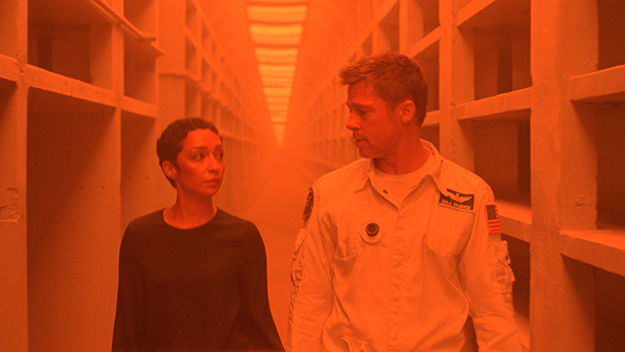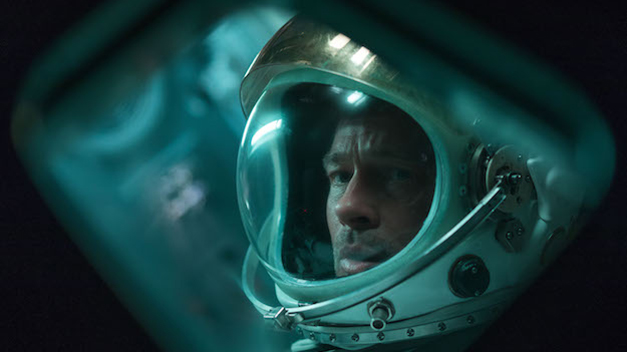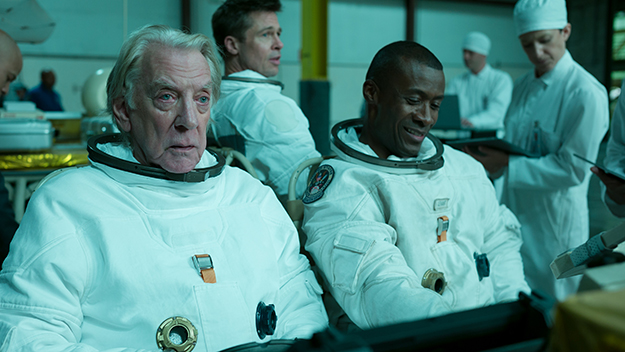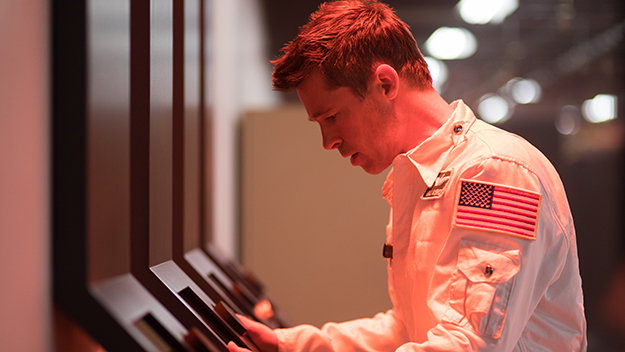Film of the Week: Ad Astra

All images from Ad Astra (James Gray, 2019)
“If Mars had life on it, I might find my wife on it,” Brian Wilson once sang—which isn’t that far, come to think of it, from the premise of Tarkovsky’s Solaris. Brad Pitt’s intrepid spaceman in Ad Astra does spare a few haunted thoughts for the wife he’s left behind, but whom he’s really hoping to find out in the great beyond is his dad. Which is to say God. Which is to say Dad. That’s the thing about James Gray’s space epic: you don’t quite know whether to read it as a religious quest or a Freudian one. Does the hero’s father stand for the deity, or is God in turn really a figure of the lost father? In Ad Astra, the two authorities are indivisible as metaphor. This is a film that aims for cosmic and existential profundity—although it’s also a big-budget action-packed sci-fi adventure with moon buggies, mano a mano free-fall combat, and Brad Pitt in a space suit.
As science fiction, Ad Astra is less Gravity, more gravitas, freighted down with furrowed-brow earnestness. The title comes from the Latin phrase ‘Per ardua ad astra’, ‘Through struggle to the stars’, and there’s no shortage of ardua here, for hero or viewer. This crazily ambitious film, sometimes successful but never less than mesmerically odd, seems an unlikely departure for the usually pragmatic, earthbound American director of The Yards, Two Lovers, and The Immigrant—although one might would have said the same for Gray’s daringly old-fashioned jungle exploration yarn The Lost City of Z.
You might see Ad Astra as an attempt to revive an archaic genre, nail-biting space adventure in the grand style—like Alfonso Cuarón’s film, it carries echoes of John Sturges’ 1969 Marooned. But Ad Astra also belongs to a current cycle of metaphysically-themed cosmic cinema that emphasizes inner space (the psyche, questions of belief) as much as outer: a diverse collection of auteur works that takes in Claire Denis’s High Life, Christopher Nolan’s Interstellar, and Terrence Malick’s deliriously overreaching docu-poem Voyage of Time. (A third mode, also intersected with here, is the more realist one that sees riding rockets as “just a job five days a week”: First Man, Alice Winocour’s superb Proxima.) The urtext of screen science fiction in its visionary mode is 2001, echoed in Ad Astra’s opening sequence, with Pitt’s face looming in close-up like Kubrick’s Star Child against the vastness of the universe, a canvas of lens flare in assorted colors—and Pitt’s character does indeed become a child in what follows.

The story, opening titles announce, takes place in the near future: “a time of both hope and conflict,” with humanity hoping for salvation through the search for intelligent life elsewhere in the universe. (What conflict exactly? We never find out—the film is more than sketchy on background details). Pitt plays Roy McBride, a career astronaut of such intrepidity that reputedly his pulse has never risen above 80. He’s a man of determination and total control: at the start, he declares, “I will only make pragmatic decisions… I am focused on the essential to the exclusion of all else.” He’ll need all his sangfroid to get him through the extraordinary opening sequence, set on the International Space Antenna—essentially a giant length of scaffolding hovering above the Earth’s surface. He’s climbing the outside of it when suddenly there are explosions and several people come hurtling down towards the planet below. McBride takes a tumble too, as does the camera, spinning wildly in midair. It’s a dazzling piece of breathless action, of a sort you’d never previously have associated with Gray, and beautifully sound designed too, kicking off with an almighty THWUMP.
It leaves us winded, but not McBride: “I should feel something,” he muses afterwards in voice-over. Intensely self-aware, he’s wrapped up in his thoughts throughout: never has a spacesuit been so overtly metaphorical, signifying the condition of being sealed in on yourself, floating through life at one remove. This man could use some therapy, and that’s precisely what his quest will be—a healing journey, if you stand to say that phrase other than through gritted teeth. It’s no accident that the film’s last word, as Roy sends a message to base, is “Submit.”
That ominous THWUMP, it turns out, was caused by a series of electrical storms in space, causing power surges so massive that they threaten to destroy the very solar system. McBride’s superiors tell him that the phenomenon is connected with his father Clifford, who left Earth years before to lead the Lima Project, a voyage to the edge of the solar system in search of life. Roy’s mission is to head out to a base on Mars and send a message to Dad. He will be accompanied by an old friend of his father, Colonel Pruitt, played by Donald Sutherland. Pruitt’s main task is to grin balefully, as only Sutherland can, before abruptly checking out of the story, leaving Roy with the briefest of gnomic advice.

Super-focused Roy undertakes never to be distracted from his task, but Gray operates differently: this episodic odyssey, which he wrote with Ethan Gross, is constantly sidelined by eccentric detours. There’s a buggy chase on the Moon, like a John Ford stagecoach pursuit or—factoring in low gravity—a sequence from The Slow and the Furious. There’s a deranged, utterly incongruous encounter with baboons, which could have been beamed in from a CGI reboot of Buck Rogers. Later comes a curious pitstop on Mars, a dreamlike sequence that seems to be from yet another film. Eventually we get an anti-climactic final act with McBride Sr. (Tommy Lee Jones), a solemn confrontation that’s less about our place in the grand galactic pattern than about the fact that Pop wasn’t there for Roy when he was a kid (although they did occasionally watch musicals together. Seriously—can you see Tommy Lee Jones as a man who likes musicals?).
Much of the film’s visual language is grounded in the levelheaded everyday. Kevin Thompson’s design is for the most part realistic, in that vein of space fiction that wants us not to gasp at the exoticism of spacecraft construction, but simply to believe in functional engineering: you believe that the doors on this film’s ships open and close with minimal fuss. There’s also a nice sequence at the Moon base, which resembles a Midwestern airport (the film’s single touch of humor: an almost subliminally glimpsed ad for Moon’s Got Talent).
When Ad Astra departs from the look of the everyday, it can be magnificently strange. The Mars sequence is hallucinatory, from the moment when Roy is greeted by a briefly-glimpsed Natasha Lyonne (“Things have been crazy round here”). Mars base features long monastic cloisters lit a deep claustrophobic red, with swathes of darkness that envelop you as you pass along them. There’s also a dusty passage haunted by a dog, snuffling around in homage to Stalker, and a chillout room where the walls ripple with images of birds, fishes, bees, and flowers (you may remember something similar, but glossier, in Blade Runner 2049).
It’s on Mars that the planet’s outpost commander (Ruth Negga) gives Roy the alarming classified info on his father. McBride Sr. may have become dangerously crazy at his command—gone the full Colonel Kurtz. If the coin hadn’t dropped before about what kind of quest this is, it does now: this is nothing if not Oedipocalypse Now.
In a dizzying flourish of loopiness, Roy has to sneak onto the next spaceship via an underground lake: here’s something you don’t see often, an underwater sequence in full spacesuit. This is really an episode of rebirth in a Freudian saga that also comes liberally stocked with umbilical cords, as well as images of Roy hitched up to feeding tubes (cut against images of him as a young boy).

If such images weren’t enough to make their point, the film is laden with a voiceover in which Roy ponders his motivation and does much filial navel-gazing: “I don’t know if I’m hoping to find him or finally be free of him.” Be free of him, probably, given that everyone’s always telling Roy that his dad “was the best of us” (he must feel like the intergalactic Julian Lennon). The voiceover, running throughout, is so laboriously solemn that you can’t believe that the usually subtle Gray didn’t have his arm twisted. At one point, after the film’s one out-and-out violent incident, Roy muses, “I see that rage in my father, I see that rage in me.” You can’t help thinking there’s something a little solipsistic about this man: he’s just seen someone’s nose torn off, and all he can say is, “I don’t want to be like my dad.”
Tommy Lee Jones’s performance is one of the stranger things in the film; his lines are delivered in a nonchalant Texan singsong, and he doesn’t seem remotely surprised to see Roy, as if he’d dropped in at the edge of the universe just to check whether his pop’s dentures were fitting OK. Indeed, Roy greets him too with suitable casualness, in a quietly awed way; depending on whether you buy into the whole thing, you will find either absolute bathos or sublime simplicity in Pitt’s “Hello Dad.”
This is the ultimate drama of male angst, in the lineage of all those Hollywood movies, inescapable in the ’80s and ’90s, about boys growing up troubled because Dad missed their big ball game. As for Roy’s mother, we learn she fell ill because of her husband’s absence but we don’t even glimpse her or learn her name. And as the son repeats the flaws of the father, Roy’s wife Eve (Liv Tyler)—seen only as a phantasmal memory and as a face on a phone screen—reproaches him for his absence. Tyler’s occasional hazy floatings in and out of sight makes it clear how much Gray also owes to Solaris—not Tarkovsky’s, but the underrated Steven Soderbergh version.
Like that film, Ad Astra uses science fiction for very intimate, personal purposes—and what’s distinctive about this gripping, sometimes preposterous film is the way that Gray sticks his neck out to balance the demands of intimacy and wham-bam spectacle. This tension makes Ad Astra feel very odd, distant even when it’s most involving. That’s partly because of Max Richter’s score, whose throbs and rippling arpeggios have an oddly narcotizing effect at the moments of highest tension. But the detachment comes above all because Pitt drifts so insouciantly through it all: rarely more than quizzically rueful, his Roy McBride is the very opposite of a sweat-soaked, cigar-chomping action hero. There’s something delicate, even baby-like about him—DoP Hoyte van Hoytema manages to shoot Pitt so that the pulpy fleshiness of his features look exceptionally soft and vulnerable. Pitt’s is a curious, minimalist performance. His McBride frays only very slightly, modestly, even in times of maximum crisis; the big payoff comes in the descent of a single manly tear, preceded by a close-up flicker in the corner of his eye. But Pitt makes you care about this conflicted hero, sensitive yet curiously uptight. We root for him, not in the hope that he’ll save the galaxy, but that his pulse will eventually creep up to a discreet 81.
Jonathan Romney is a contributing editor to Film Comment and writes its Film of the Week column. He is a member of the London Film Critics Circle.







